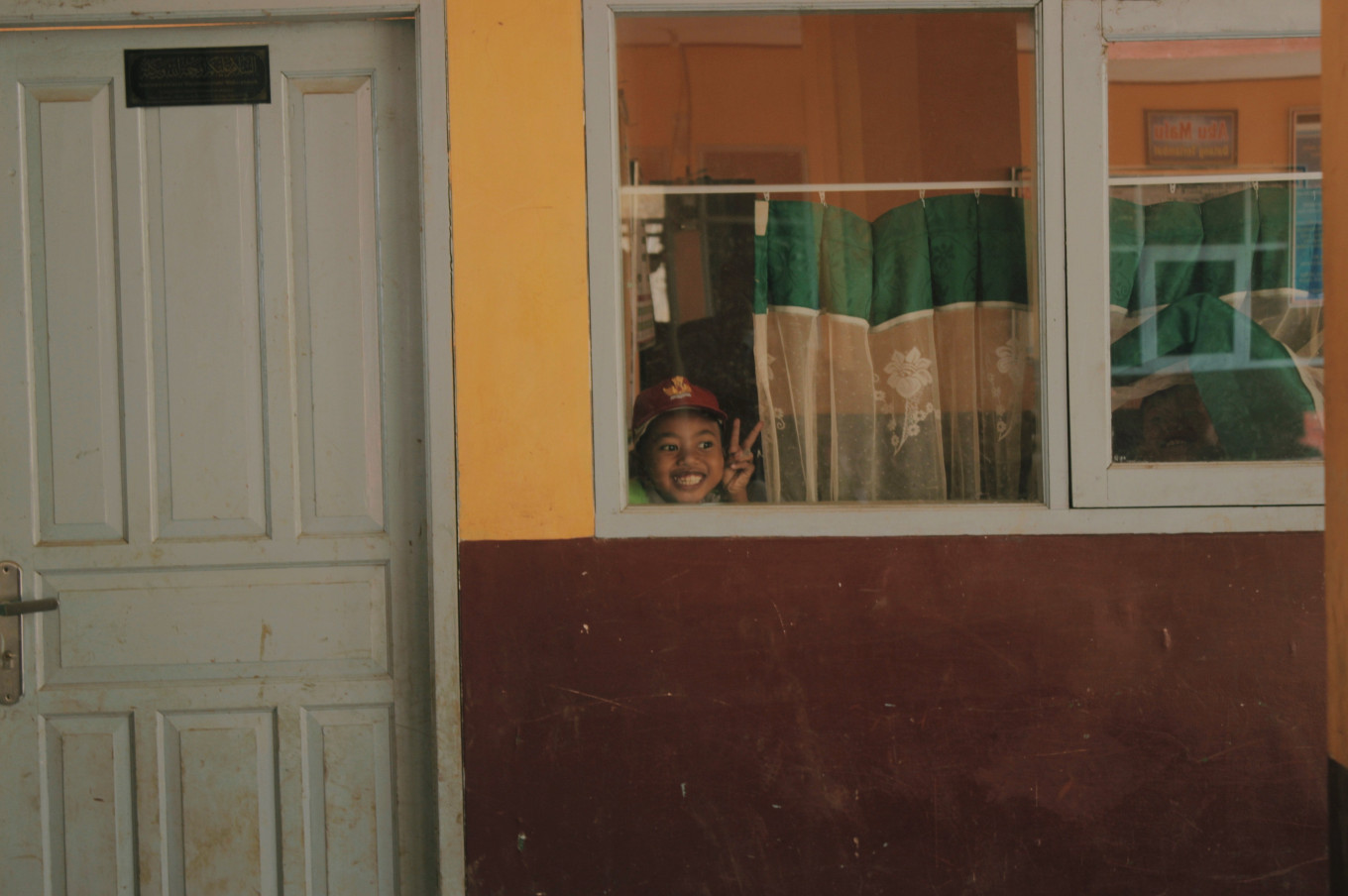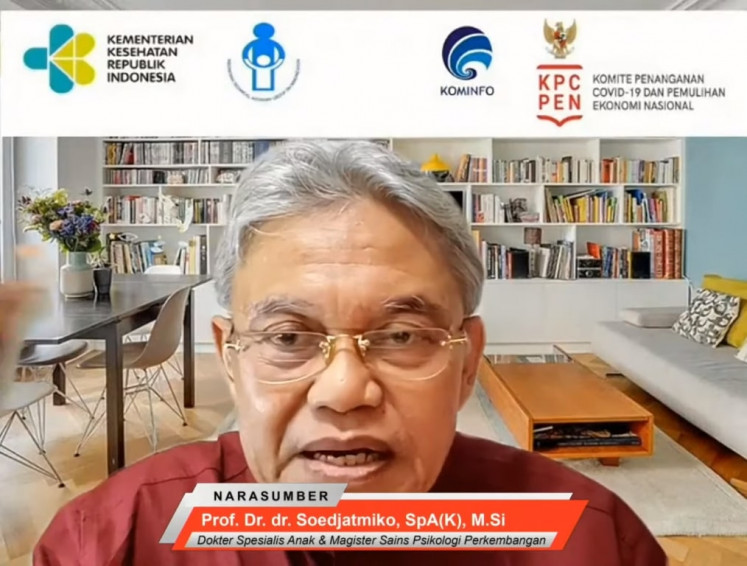Cover-ups and crowded classes: Indonesian schools not ready to reopen, educators say
As schools start reopening once more, several teachers are wary about students’ safety given their schools’ lack of preparation and reluctance to be as strict as they should.
Change Size

A
s schools start reopening once more, several teachers are wary about students’ safety given their schools’ lack of preparation and reluctance to be strict
As a result of the decrease in COVID-19 cases in Indonesia, Education and Culture Minister Nadiem Makarim has yet again pushed to reopen schools. Preparations are now being taken by elementary to high schools to maximize in-class learning, especially in Jakarta and cities across Java that are implementing levels 1 to 3 of the public activity restrictions (PPKM).
However, some parents have shown concern over the hasty move, given that they have just, if at all, gotten out of the second wave of COVID-19. Some of them believe that, despite health protocols being implemented at schools, the country’s steady number of cases is not something that can be overlooked.
They have the right to be concerned. Just last week, the Association for Education and Teachers (P2G) revealed that health protocol violations were still prevalent in many schools from Bekasi to Tasikmalaya.
“These violations are not new," Satriwan Salim, P2G national coordinator, said to katadata.co.id on Sept. 4. He said students were still found gathering and riding public transportation together.
But it could be worse. The Jakarta Post has been approached by several teachers who claim that, unbeknownst to the parents of the students, their schools are barely managing to implement the health protocols.
Surface-level promise
Rina (not her real name), 23, decided not to extend her contract with a prominent private school in Cibeunying, Bandung, after a year teaching there. She could no longer stand the school's poor adherence to health protocols.
“It’s like we are told to lie [to the parents],” she told the Post in a call on Sept. 1.
The health protocols that the school promised were, on paper, strict: Only five students could be in a class, with only two hours of study time; the school area would be disinfected before and after school hours; students would be screened before they could come in; those who were sick or had just returned from out of town were not allowed to go to school for two weeks.
But parents were not aware that these rules were barely implemented.
“The truth is, nothing is being disinfected,” Rina said. “There’s only a janitor who mops the floor and does other general cleaning after students have gone home.”
Furthermore, there have been many accounts of students who were clearly sick and showed symptoms of COVID-19, but their parents insisted that they were okay, and the school’s management let it slide.
“And we are required to make sure no other parents know that their children were just in the same classroom as a sick student,” she said. “This did not happen rarely.”
Another teacher who also quit the school, Muthia (not her real name), also confirmed these instances. Rina and Muthia were the few who were wary of the situation, whereas other teachers were not as strict.
“Even other teachers used to hold dinner parties with the school’s head committee,” she told the Post on Sept. 2.
The school’s reluctance to be strict resulted in a number of teachers catching the virus. And to hide this from the parents and several concerned teachers, the school’s management came up with excuses like “sick leave” or “out-of-town assignment” to cover up the truth.
“The last few days before I quit, my homeroom partner and I took care of the students’ report cards. […] But then, two weeks later, she told me that around that time she was positive for COVID-19,” Rina said. From that point, she learned from her other coworkers that information about a teacher’s COVID-19 status would always be covered up.
Governmental problems
“What baffled me was that this is a private school,” Muthia said. “I would understand if it were a small state school.”
Such occurrences did happen at state schools. Just last week, a class at SD 05 Jagakarsa state elementary school in South Jakarta was temporarily halted due to health protocol violations.
“In a video, the teachers and students are shown wearing their masks incorrectly on their chins,” Jakarta Education Office spokesperson Taga Radja Gah told detik.com on Sept. 5.
Thanks to the video circulating, the in-class learning was halted, but most of the time parents are not so lucky, as the evidence stays within the realm of each school.
A principal of a private school in North Jakarta revealed to the Post that monitoring of in-class learning was very lax. Ben (not his real name) said he encountered many examples of protocol violations on his WhatsApp group chat for teachers and evaluators across the area.
“There are so many teachers from state schools who upload pictures of themselves without a mask to the internal WhatsApp group,” Ben said to the Post on Sept. 2.
What made it worse was that there was a member of a COVID-19 task force in that group, who was supposed to be monitoring them strictly.
“Pictures often circulate in which you can see students sitting side-by-side with their masks off. The teachers share them on the WhatsApp group. In one instance, an official who was supposed to be monitoring them replied, ‘Wonderful! You can finally get together again, keep it up!’” he shared.
Aside from such violations, Ben also saw a vast difference in the ways many schools implemented the health protocols, even those in the same area.
“Sometimes, the problem is that there are gubernatorial regulations that contradict the central government's regulations, and then in its implementation, the COVID-19 task force would also say something else,” Ben said, noting a huge ‘he said, she said’ culture among school managements.
Satriwan of P2G shared a similar sentiment. He said a study duration limit was not regulated in the joint ministerial decree (SKB), which meant schools decided on their own study duration.
"Bukittinggi implements an eight-hour study time, Ende a six-hour one. In fact, [schools in] Bukittinggi study from Monday to Saturday," he said to katadata.co.id.
Question of safety
At the end of the day, the decision to send children back to school is in the parents’ hands, as has been stated by the government.
The Indonesian Medical Association (IDI) seems to be aware of the wariness felt by parents. On Saturday, pediatrician Dr. Soedjatmiko went live on the IDI’s YouTube channel to answer some of the most frequently asked questions, and he agreed that, in the initial stages, the implementation of in-class learning would not be optimal.

“I think all parties have done their best, but sometimes there are just some aspects that falter, or some people only work half-heartedly. […] In this early phase, everything will not be as orderly as we hoped it would be. Nothing is perfect right away. There will be many shortcomings,” he said on YouTube.
He underlined the fact that human resources played the most important part here. Schools need to prepare the protocols meticulously, but parents also need to prepare their children to obey the protocols habitually.
“I’ve had some reports that first and second graders often find it hard to keep wearing their masks,” Dr. Soedjatmiko said.
With all this in mind, followed by more evaluations and monitoring, he hoped that the implementation of in-class learning would get better and better.
But when children’s lives are at stake, parents might want to think twice about these shortcomings. In the YouTube comment sections of Dr. Soedjatmiko's video's, some students pleaded for help.
“Doctor, my name is Alfath Fadilah, a ninth-grader at SMP IT Mentari Ilmu in Karawang, West Java. My school barely follows the health protocols,” she wrote. “People get together and then after school they go to cafes […] how should I respond to this, Doc?”









